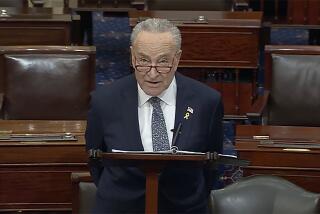Chuck Hagel’s opponents switched gears
WASHINGTON — For all the controversy over President Obama’s choice for Defense secretary, many of Chuck Hagel’s most outspoken critics were for the former Nebraska senator before they were against him.
In 2006, Sen. John McCain (R-Ariz.), who forged a close bond with Hagel over their shared service in Vietnam and penchant for bucking the Republican establishment, said, “I’d be honored to have Chuck with me in any capacity.”
In 2007, Senate Republican leader Mitch McConnell acknowledged that many of Hagel’s dire predictions about the Iraq war had come true. He praised Hagel at an Omaha fundraiser as “one of the premier foreign policy voices” and “one of the giants in the United States Senate.”
Sen. Pat Roberts (R-Kan.) worked with Hagel for years on efforts to ease the embargo against Cuba and promote trade policies to help Midwestern farmers. He tolerated playful ribbing from Hagel when the University of Nebraska beat Kansas schools in football.
Now, McCain says he worries about his fellow Republican’s “worldview.” McConnell said, “I’m going to take a look at all the things that Chuck has said over the years and review that … in terms of his qualifications to lead our nation’s military.” And Roberts has said flatly that he won’t back his onetime friend for the Pentagon post, citing “a lot of concern about Chuck.”
Several factors are behind the opposition to Hagel, including the anger he caused among many Republicans by criticizing the George W. Bush administration’s Iraq policies and by endorsing some Democrats for office.
At least in public, the opposition to his nomination has focused on remarks he’s made on Israel and Iran, particularly one 2006 interview in which he said the “Jewish lobby intimidates a lot of people” in Congress. Critics have objected to his referring to the lobbying as “Jewish” rather than “pro-Israel.”
Supporters note that Israeli leaders haven’t voiced any such worries about Hagel, who has often called Israel “a close friend and ally.” They say he’s been the victim of a U.S. political landscape that has become not only more partisan but less tolerant of criticism of Israel. Particularly on the Republican side of the aisle, unwavering support for Israeli policies has become a litmus test over the last decade.
“The debate about the U.S. relationship with Israel has certainly moved to the right,” said Bob Kerrey, a Nebraska Democrat who served alongside Hagel in the Senate until 2001. “You could oppose settlements in the 1990s,” he said, referring to Israelis building on land beyond Israel’s 1968 borders. “Not anymore.”
A review of Hagel’s history shows a worldview, particularly on the Middle East, that does not fit easily into current political divisions.
Shaped by a tour in Vietnam — where mine explosions left him with burns and shrapnel lodged in his chest — Hagel, 66, has long been a reliable if sometimes blunt voice for caution in using military force. He has called for engaging with America’s enemies instead of isolating them and for a healthy but restrained defense budget.
He first ran for the Senate in 1996 on a pledge to increase defense spending, which had been cut sharply after the end of the Cold War. By the time he ran for his second term, defense spending had begun to soar in the buildup after the Sept. 11 attacks. In recent years he’s called the Pentagon budget “bloated.”
Hagel had been in the Senate barely a year when, during a Foreign Relations Committee hearing in 1998, he cited a “perception in the Arab world that we’ve tilted way too far toward Israel in the Middle East peace process.”
But at the same time he was building ties to Israeli leaders. In December 2000, a surge of deadly violence threatened President Clinton’s bid to seal an Israeli-Palestinian peace deal in the final weeks of his presidency. At the request of the incoming Bush administration, Hagel carried an urgent message to Israeli leaders.
In a private meeting at the Israeli defense ministry, Hagel assured embattled Prime Minister Ehud Barak that Bush would support the peace deal if he signed it. It was a crucial promise from the American president-elect, who was then little known in the Middle East. In the end, Palestinian opposition killed the peace bid.
Martin Indyk, then-U.S. ambassador to Israel and the only other person in the meeting, said Hagel was “very sensitive, sympathetic and most of all supportive. He helped to calm Barak.”
In recent years, Hagel has rejected unilateral sanctions against Iran, arguing that they only inflame anger in the Muslim world, but has said he supports sanctions imposed in concert with U.S. allies. He has argued against military action to stop Iran from building a nuclear weapon but, in a September opinion article in the Washington Post, called for “keeping all options on the table, including the use of military force.”
That skepticism about sanctions has a long history with Hagel. In 2001, he was one of two senators to vote “no” on renewing unilateral U.S. sanctions against Iran and Libya.
“Somebody has to give another point of view here,” Hagel said at a Senate Banking Committee hearing in which he questioned whether the sanctions worked.
But at the same hearing, he invoked Israel’s needs, saying, “I don’t think you bring more security to Israel by this kind of policy — which, again, unless you can tell me otherwise, has not produced any results.”
In a 2006 speech at the Brookings Institution, Hagel criticized U.S. boycotts of talks with Hamas, Iran, Syria and other foes, saying that approach impeded efforts to end crises in the region.
“I don’t know how the world has gotten better” by the U.S. refusal to talk, he said. “Things have gotten worse by any measure. And so it tells me that we’d better take some serious review of our current policy.”
Many of Hagel’s words echo those of Obama, who, like many Israeli military leaders, is said to be reluctant to launch a military strike on Iran. Obama has imposed tough sanctions on Iran but resisted more severe measures pushed by some in Congress because they could weaken a broad coalition of nations — including China — that backs the measures currently in place.
Hagel’s supporters say that in his two terms in the Senate — he now serves as chairman of the Atlantic Council, a think tank that promotes multilateralism — he was a consistent realist.
“The principles he came away with from Vietnam are still there,” said Charlyne Berens, a University of Nebraska-Lincoln journalism professor who wrote a 2006 biography on Hagel. “He’s been saying these things for more than a decade.”
More to Read
Get the L.A. Times Politics newsletter
Deeply reported insights into legislation, politics and policy from Sacramento, Washington and beyond. In your inbox three times per week.
You may occasionally receive promotional content from the Los Angeles Times.







